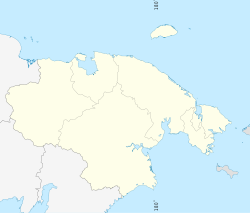Neshkan, Russia
| Neshkan (English) Нешкан (Russian) Нэскэн (Yupik) |
|
|---|---|
| - Rural locality - Selo |
|
 Location of Chukotka Autonomous Okrug in Russia |
|
|
|
|
|
|
|
| Administrative status (as of June 2009) | |
| Country | Russia |
| Federal subject | Chukotka Autonomous Okrug |
| Administrative district | Chukotsky District |
| Municipal status (as of November 2004) | |
| Municipal district | Chukotsky Municipal District |
| Rural settlement | Neshkan Rural Settlement |
| Administrative center of | Neshkan Rural Settlement |
| Statistics | |
| Population (2010 Census) | 704 inhabitants |
| Population (January 2016 est.) | 637 inhabitants |
| Time zone | PETT (UTC+12:00) |
| Founded | Mid 1950s |
| Postal code(s) | 689330 |
| Dialing code(s) | +7 42736 |
Neshkan (Russian: Нешкан; Naskuk in the Yupik language, meaning head of a ringed seal after a nearby hill) is a rural locality (a selo) in Chukotsky District of Chukotka Autonomous Okrug, Russia. It is located on the shores of the Chukchi Sea on a sandy spit that divides Neskyipilgyn Lagoon from the sea, close to Idlidlya Island. Population: 704 (2010 Census); Municipally, Neshkan is subordinated to Chukotsky Municipal District and incorporated as Neshkan Rural Settlement.
Like many other villages in Chukotka, Neshkan was founded as a result of Soviet economics. In the 1950s, attempts to unify the itinerant reindeer herders of the area, consisting of the Nuteikvyn, Anayan, Tolgunen, and Vylkarney amongst others into a collective farm led to the creation of the village. The village took its name from the Chukchi word Naskuk, meaning "Seal's Head", so called because one of the mountains surrounding the village looks like a seal's head when viewed from the sea.
Neshkan has seen some benefit in recent years from the money that has been generated by the exploitation of the oil and gas present in the area, as a number of multi-story houses were built in the village in 2005.
Unlike such villages as Tavayvaam, which have suffered serious economic hardships since the dissolution of the Soviet Union, when all the reindeer owned by the villagers were lost, leading to continuing high unemployment in the area, Neshkan's economy is still dominated by reindeer herding, with there being six separate herds maintained by the villagers, though this is also supplemented by fishing.
However, the village still endures considerable economic isolation as a result of its geography. Only pensioners are paid in cash, while almost all other transactions are barter or coupons (which are often paid to state employees in the region in lieu of cash). What cash is available is spent on necessary supplies, which, due to the isolation of the village and the resulting difficulties in transporting food and other supplies, is often nearly double the price found elsewhere in the region.
...
Wikipedia

